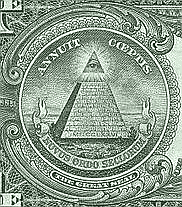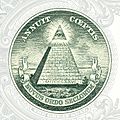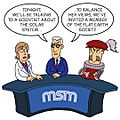Conspiracy theory facts for kids
A conspiracy theory is a story that says a group of people secretly agreed to do something bad or hide important information from everyone else. These stories often suggest that big events in history happened because of these secret groups. Conspiracy theories usually don't have much strong proof. However, sometimes a small part of a theory might turn out to be true when more facts are found later.
Contents
What is a Conspiracy Theory?
A conspiracy theory is like a secret plot story. It claims that a small group of people, called "conspirators," are working together in secret. Their goal is usually to gain power, money, or control, often by doing things that are wrong or unfair. They try to keep their plans hidden from the public.
Why Do People Believe Them?
People might believe conspiracy theories for different reasons. Sometimes, it's because they want to understand confusing events. If something big or scary happens, a conspiracy theory can offer a simple explanation, even if it's not true. People might also feel like they have special knowledge if they believe a secret theory.
- To explain complex events: When something confusing or upsetting happens, a conspiracy theory can seem to offer an easy answer.
- To feel special: Believing a secret theory can make people feel like they know something others don't.
- Lack of trust: If people don't trust leaders or official sources, they might be more open to secret stories.
- Looking for control: Sometimes, believing in a hidden plan can make people feel like they understand why things are happening, even if they can't change them.
How to Think Critically About Them
It's important to think carefully about any story, especially a conspiracy theory. Here are some ways to be a good detective of information:
- Look for real evidence: Does the story have facts, documents, or reliable witnesses to support it? Or is it just based on guesses and rumors?
- Check the source: Where did the story come from? Is it a trustworthy news organization, a scientific group, or just a random website?
- Consider other explanations: Are there simpler, more likely reasons for what happened?
- Be careful of strong feelings: Conspiracy theories often try to make you feel angry or scared. When you feel strong emotions, it's harder to think clearly.
- Ask questions: Who benefits from this story? Why is it being told now?
The Problem with False Balance
Sometimes, news reports might try to give "both sides" of a story, even if one side has almost no evidence. This is called "false balance." It can make a conspiracy theory seem as believable as a proven fact. It's important to remember that not all ideas are equally true or have equal support.
Images for kids
-
The Eye of Providence, or the all-seeing eye of God, seen here on the US$1 bill, has been taken by some to be evidence of a conspiracy involving the founding fathers of the United States and the Illuminati.
See also
 In Spanish: Teoría conspirativa para niños
In Spanish: Teoría conspirativa para niños
 | Madam C. J. Walker |
 | Janet Emerson Bashen |
 | Annie Turnbo Malone |
 | Maggie L. Walker |





